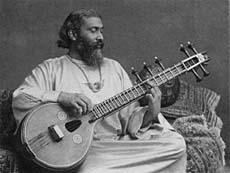The Indian mystic and musician Hazrat Inayat Khan, born on July 5, 1882, was the first teacher to bring Sufism, Islamic mysticism, to the West. He put the accent on the inner life and the annihilation of the false self. In his teachings, Khan emphasized the importance of developing what he called "the art of personality," which includes the following character qualities: respect, consideration, hospitality, humility, graciousness, tenderness of feeling, sympathy, moderation of speech, and modesty. The yearning for God, he taught, produces a way of life that is courteous and loving and thoughtful of others.
 Quotes
Quotes
To celebrate his birthday ponder these quotations and adopt one of them as a guiding star for the week:
- Meditation in Everyday Life
"Therefore the one who has realized the inner life is a mystery to everyone; no one can fathom the depth of that person, except that he promises sincerity, he emits love, he commands trust, he spreads goodness, and he gives an impression of God and the truth. For the man who has realized the inner life every act is his meditation; if he is walking in the street it is his meditation; if he is working as a carpenter, as a goldsmith or in any other trade or business, that is his meditation."
— The Inner Life
- Mysticism and Unity
"What is religion to the mystic? The religion of the mystic is a steady progress towards unity."
— The Inner Life
- The Mystic Refuses to Correct Others of Their Follies or Condemn Them for Their Errors
"A mystic will know most and yet will act innocently. It is the ones who know little who make a fuss about their knowledge. The more a person knows, the less he shows to others. Besides, a mystic is never ready to correct people for their follies, to condemn them for their errors, or to accuse them of foolishness. He sees so much of errors and follies and foolishness that he never feels inclined to point them out; he just sees life in its different aspects, and understands the process an individual goes through in life. It is by mistakes and errors that one learns in the end, and a mystic never feels that he should condemn anyone for them; he only feels that they are natural."
— The Inner Life
- Studying in the School of Life
"For the mystic life is a school in which to learn, every moment of one's life; it is a continual study, And the scripture of the mystic is human nature; every morning he turns a new page of this scripture."
— The Inner Life
- Being a Friend of All
" The life that the Sufi ought to live may be explained in a few words. There are many things in the life of a Sufi, but the greatest is to have a tendency to friendship; this is expressed in the form of tolerance and forgiveness, in the form of service and trust. In whatever form he may express it this is the central theme: the constant desire to prove one's love for humanity, to be the friend of all."
— The Inner Life
- The Mystic's Prayer
"Give me, Oh God,
Deep thoughts
High dreams
Few words
Much silence
The narrow path
The wide outlook
The end in peace.
Amen."
— The Inner Life
